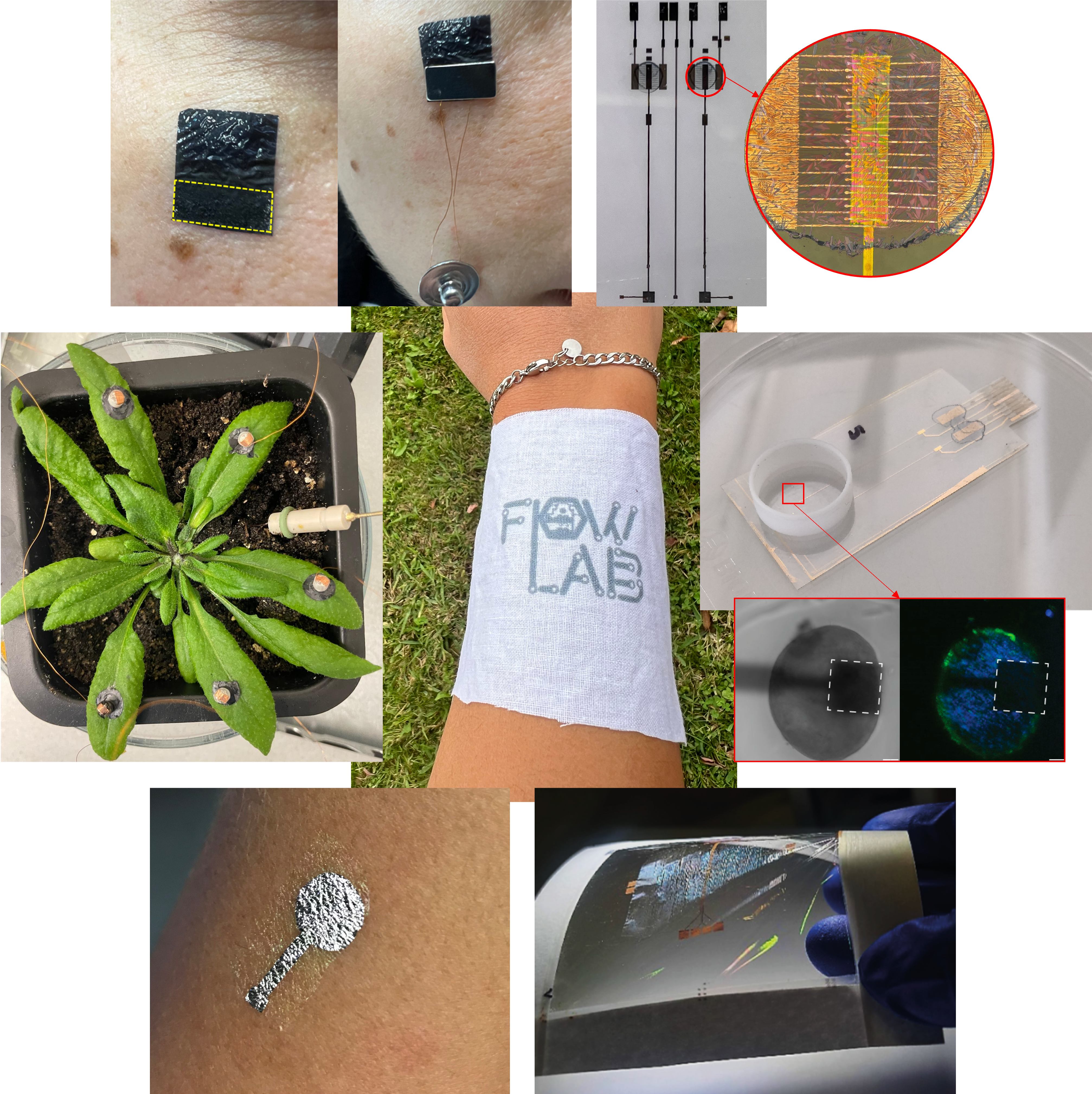
Located at the intersection of electronics and biology, the FLOW LAB is engaged on multiple fronts, ranging from cutting-edge scientific research in the field of biomedical sensing to the development of wearable and epidermal devices for the detection of biochemical, biophysical, and bioelectrical parameters.
Research conducted at FLOW Lab is strongly oriented toward the practical implementation of these technologies, with a particular focus on the development of potentially scalable solutions based on organic semiconductor sensors. These offer unique opportunities in biomedical diagnostics due to their distinctive features, including the wide range of usable materials (flexible, transparent, biocompatible, and low-cost) and the adoption of fabrication techniques that are easily scalable such as large-area processes like inkjet printing, screen printing, and spray coating, which are economically advantageous.
Another key research area of the lab concerns so-called "tattooable" technologies. This field of study, commonly referred to as “epidermal electronics”, focuses on the development of ultra-thin electronic devices (with overall thicknesses below one micrometer). This unique technological approach offers highly specific advantages in biomedical applications, enabling the fabrication of imperceptible, ultra-thin sensors that can seamlessly conform to the irregular surface of human skin.
In addition to wearable technologies, the lab is also dedicated to the development of advanced sensors and biosensors for cellular applications, both in vitro and in vivo, an area of great importance within the biomedical landscape. The investigation of bio-interfaces based on innovative materials (such as recyclable and biodegradable “green” materials) and low-cost fabrication techniques has significant implications in pharmaceutical research, fundamental studies of neurodegenerative diseases, and, in particular, personalized medicine.
Ongoing research projects:
- COPAN Lab
- ANALYSER - AN orgAnic muLti-functional sYStem for the bioelectrochemical characterization of cellular assEmblies in vitRo, Ministry of Research PRIN, 2023-25
- FREE – Pharmacoresistance in Epilepsy, PoC Project, Ministry of Entreprises and Made in Italy, 2023-24
- MISCELL - Minimally Invasive multi-Sensor systems for CELL monitoring in bioreactors, Ministero dell’Università e della Ricerca,Bando a Cascata - ECOSISTEMA DELL’INNOVAZIONE “Tuscany Health Ecosystem” - THE"
- STOPME - Supporting Termination Of stereotyPies in patients with rett syndroME by advanced ambient intelligence, Ministero dell’Università e della Ricerca,Bando a Cascata - ECOSISTEMA DELL’INNOVAZIONE “RAISE - ROBOTICS AND AI FOR SOCIO- ECONOMIC EMPOWERMENT"
Head: Prof. Andrea Spanu
Research staff:
Prof.ssa Annalisa Bonfiglio
Dr. Fabio Terranova
Dr. Davood Hatami
Alessandra Lenzi
Hafiz Atasham Ul Hassan
Arianna Melis
National Collaborations
Università di Cagliari, Dipartimento di Energia Elettrica ed Elettronica
Università di Catania, Dipartimento di Fisica e Astronomia “Ettore Majorana”
Università di Bologna, Dipartimento di Fisica e Dipartimento di Chimica Industriale
Politecnico di Milano, Dipartimento di Chimica, Materiali e Ingegneria Chimica “G. Natta"
Università di Pavia, Dipartimento di Ingegneria Civile e Architettura
Università di Genova, Dipartimento di Informatica, Bioingegneria, Robotica e Ingegneria dei Sistemi
Università di Pisa, Centro “E. Piaggio”
Istituto Italiano di Tecnologia, Genova
Istituto Italiano di Tecnologia, Pontedera
Università di Modena e Reggio Emilia, Dipartimento di Scienze Mediche e Chirurgiche, Materno-Infantili e dell'Adulto
COPAN Italia Srl
Centro Nazionale Adroterapia Oncologica (CNAO)
International collaborations
Linkoeping University, Svezia
Imperial College, UK
Danube Private University, Austria
By fostering collaborations, we aim to amplify the impact of our research and contribute to the broader scientific community.
We're keen on fostering fresh scientific partnerships and tech transfer collaborations to amplify the impact of our research and propel the advancement of knowledge.
• Spanu, A., Taki, M., Baldazzi, G., Mascia, A., Pietrabissa, R., Pani, D., ... & Bonfiglio, A. (2024). Spray-Coated, Magnetically Connectable Free-Standing Epidermal Electrodes for High Quality Biopotential Recordings. Advanced Engineering Materials, 26(11), 2302195, IRIS hdl: 20.500.12076/16897.
• Hatami, D., Hasler, R., Spanu, A., Dostalek, J., Kleber, C., Knoll, W., & Bonfiglio, A. (2025). A hybrid OTFT-SPR system for simultaneous electronic and optical sensing. Scientific Reports, 15(1), 15244.
• Terranova, F., Viola, F. A., Di Lisa, D., Massobrio, P., Martinoia, S., Bonfiglio, A., & Spanu, A. (2025). Organic charge-modulated transistor for electrophysiological measurements of human-derived neurospheroids. Frontiers in Bioengineering and Biotechnology, 13, 1571011.
• Hatami, D., Mariani, F., Gualandi, I., Terranova, F., Scavetta, E., Bonfiglio, A., & Spanu, A. (2025). Extended gate organic field effect transistor for calcium ion sensing towards biomedical applications. Sensors and Actuators Reports, 9, 100340.
• Viola, F. A., Spanu, A., Alfaro, A. D., Criado-Gonzalez, M., Mecerreyes, D., & Bonfiglio, A. (2024, October). A Wearable EEG Band Based on Spray-Coated Textile Bioelectrodes. In 2024 IEEE SENSORS (pp. 1-4). IEEE, IRIS hdl: 20.500.12076/20537
The full list of publications is available on the following page of the IRIS archive.
We warmly welcome inquiries, collaboration proposals, and engagement with our research community.
Feel free to reach out: Flowlab@iusspavia.it